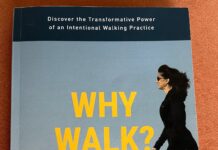by Dr. Barbara Roberts
If you’ve made it to 40 in relatively good health, congratulations! You probably already practice healthy behaviors, or at least, failing that, you’ve been incredibly lucky. But much like with an older car, as we get older, in order to stay in good condition, we need more upkeep than we did say when we were 20 years old. Some of the following suggestions for maintaining good health apply to both women and men, but these are followed by some gender-specific recommendations.

Exercise to Maintain Good Health After 40
After age 40, regular exercise becomes even more critical to living a long and healthy life. Regular aerobic exercise has been shown to lower blood pressure, improve blood fats, lower blood sugar levels, and lessen insensitivity to insulin, a common finding in those who have pre-diabetes or Type 2 diabetes. People who exercise regularly are less likely to develop clots in the arteries or veins, and our ability to dissolve clots is enhanced by exercise. Exercise also helps combat depression probably because it raises our endorphin levels, and endorphins are our natural anti-depressants. Compared to sedentary individuals, those who exercise regularly have a significantly lower risk of dying of heart disease. The recommended amount of exercise is 30 minutes of moderate exercise (such as walking at 3 mph) most days of the week.
For women – after the age of 40, the average woman loses about a half an inch of height per decade, due mainly to osteoporosis. After age 70 height loss is even more rapid. That is why it is important for women to start weight lifting by age 40.
Weight training has been shown to increase bone density by putting stress on bones. A recent study published in the Journal of Sports Medicine and Physical Fitness showed that even light weights, (about 20% of the maximum they could lift) were effective in increasing bone density in women, as long as they did at least 100 repetitions of the exercise in one hour. Here’s a relatively risk-free and simple way to prevent osteoporosis, that doesn’t involve taking drugs, some of which actually lead to an increase in fractures when taken long-term.
Alcohol may exacerbate height loss as it can lower calcium levels. So, women might also want to consider limiting their alcohol intake, especially after age 40.
Exercise for Men
For men – it is normal for the prostate to increase in size as men age. This condition is called Benign Prostatic Hypertrophy or BPH. After age 40, and particularly after age 50, men may notice frequent urination, difficulty starting the urinary stream, and dribbling as symptoms of BPH.
An increased risk of BPH has been associated with sedentary life style, obesity, diabetes, high blood pressure and smoking. Heavy alcohol intake has also been associated with an increased risk of BPH while low to moderate intake of alcohol is associated with a lower risk. Certain medications can increase the risk that BPH will cause symptoms. These include the blood pressure/angina medications called beta-blockers, antihistamines and decongestants.
So how can men over 40 help to prevent BPH? Since 1995, 14 studies have been identified that investigate the clinical relationship between exercise and BPH. Prospective cohort data from these studies support a clinically significant, independent, and strong inverse relationship between exercise and the development of BPH. In laymen’s terms, this means that the more you exercise, the less likely you are to develop BPH.
The bottom line for both women and men is that exercise and moderating alcohol intake after age 40 are crucial to preventing two of the most common diseases that afflict older people, osteoporosis and BPH
Watch your Diet to Maintain Good Health After 40
If you are serious about staying healthy, eat the way peasants did in the lands bordering the Mediterranean Sea in the 1950’s. Eat food that’s been “monkeyed with by human beings” as little as possible. Especially avoid sugary treats, processed grains and seed oils. Dairy fat is actually good for you – sugar is your enemy not fat! Slather your veggies in olive oil. They will taste great and you will absorb fat-soluble vitamins more efficiently.
Things to Get Checked by Your Doctor
The incidence of high blood pressure increases with age, so have your blood pressure checked once a year, or more frequently if you are on medication to treat hypertension. According to a naturopathic doctor in Scottsdale, have your fasting blood sugar checked once a year, or more often if you are diabetic or pre-diabetic. The incidence of diabetes also increases with age.Have screening colonoscopies starting at age 50 or sooner if you have a family history of colon cancer. The US Preventive Services Task Force recommends that you ask your doctor about screening colonoscopy for those ages 76 to 85. There is a relatively new test called Cologuard which detects certain DNA markers and blood in the stool. It can detect up to 92% of colon cancers.
~ ~ ~ ~ ~
Barbara Hudson Roberts, MD was the first female adult cardiologist in the state of Rhode Island. She is an active feminist, helped found the Women’s National Abortion Action Coalition (WONAAC) and is on the voluntary faculty at Brown where she is an Associate Clinical Professor of Medicine. Her memoir is The Doctor Broad: A Mafia Love Story. Visit www.thedoctorbroad.com











